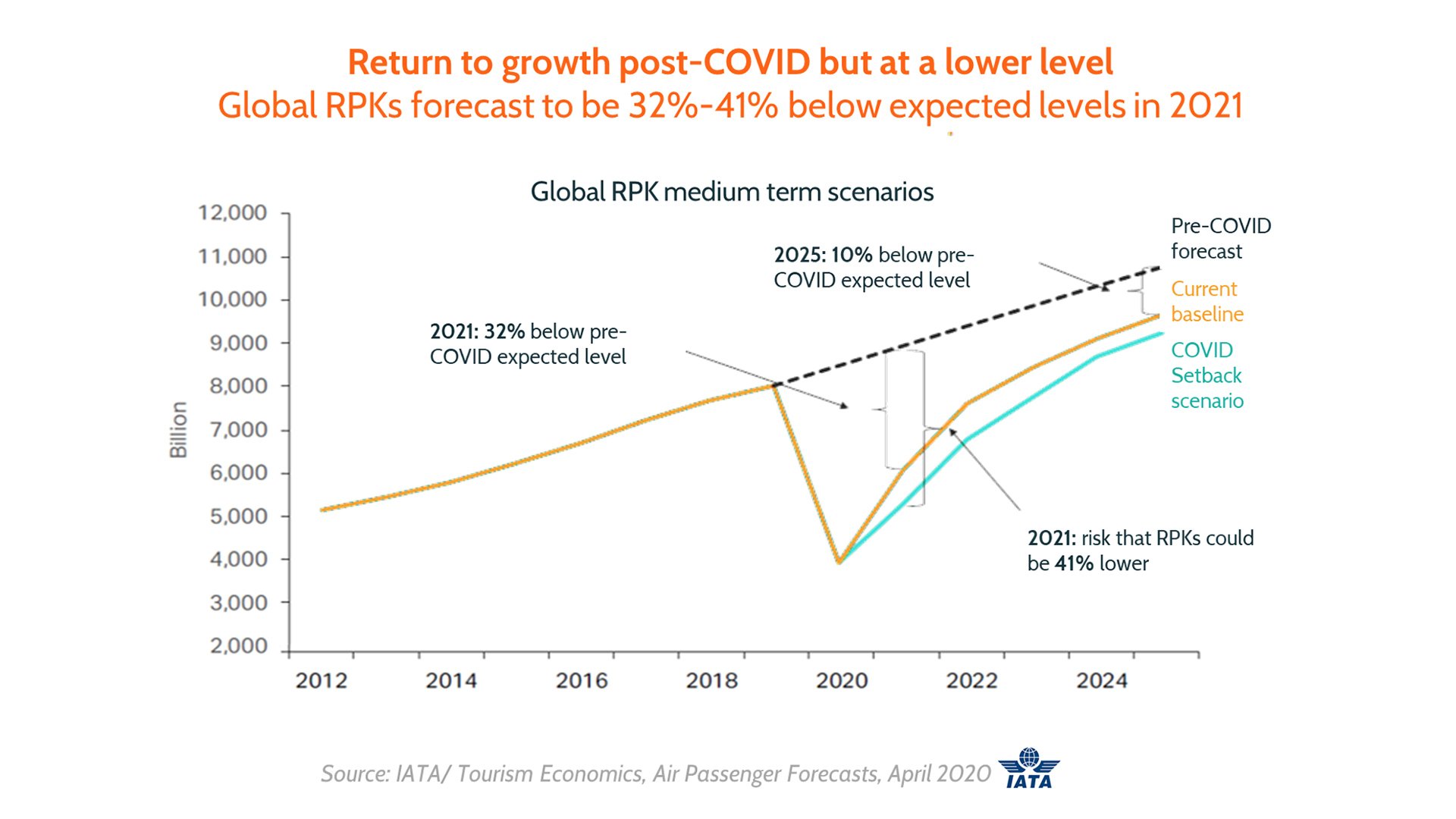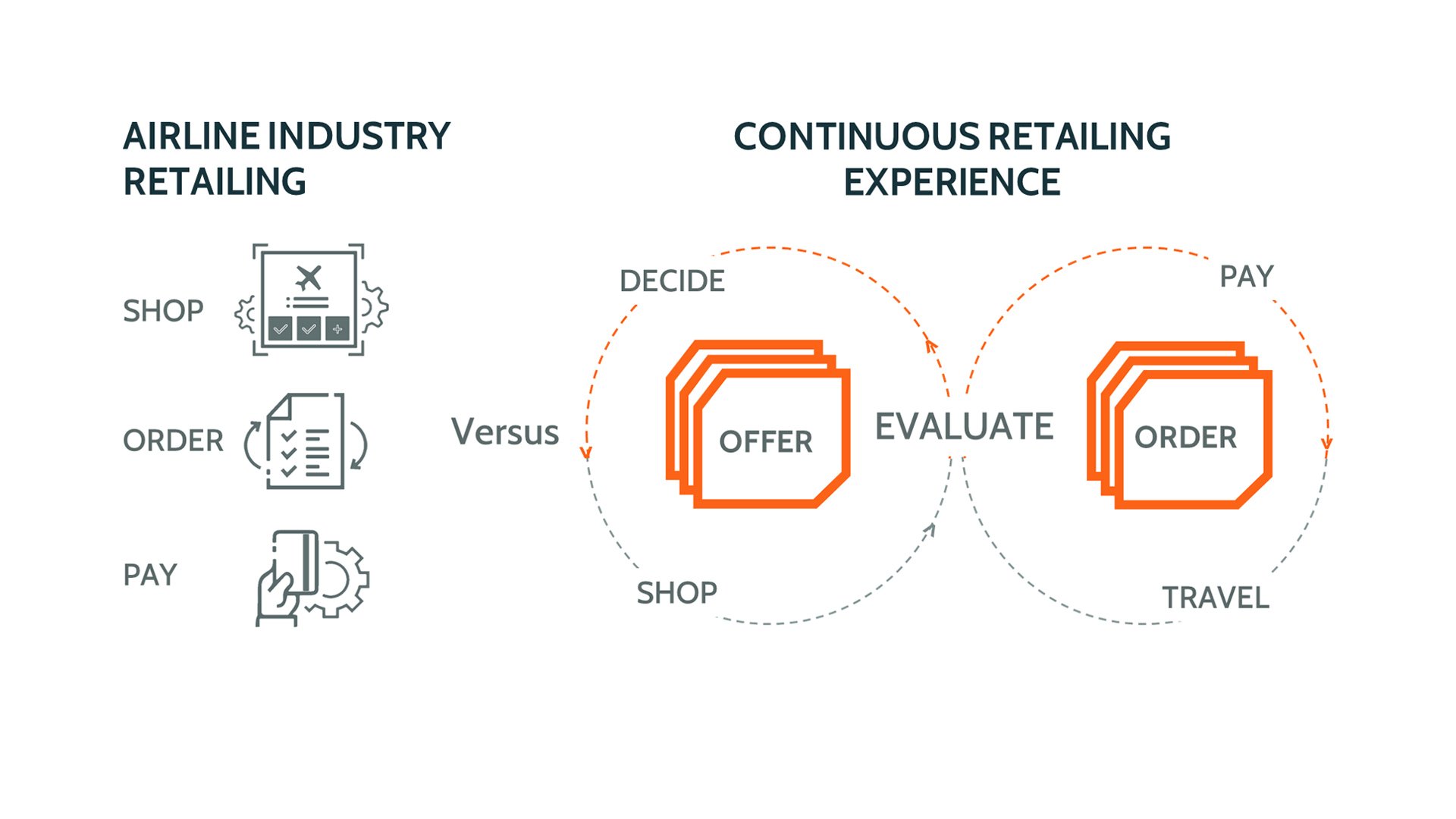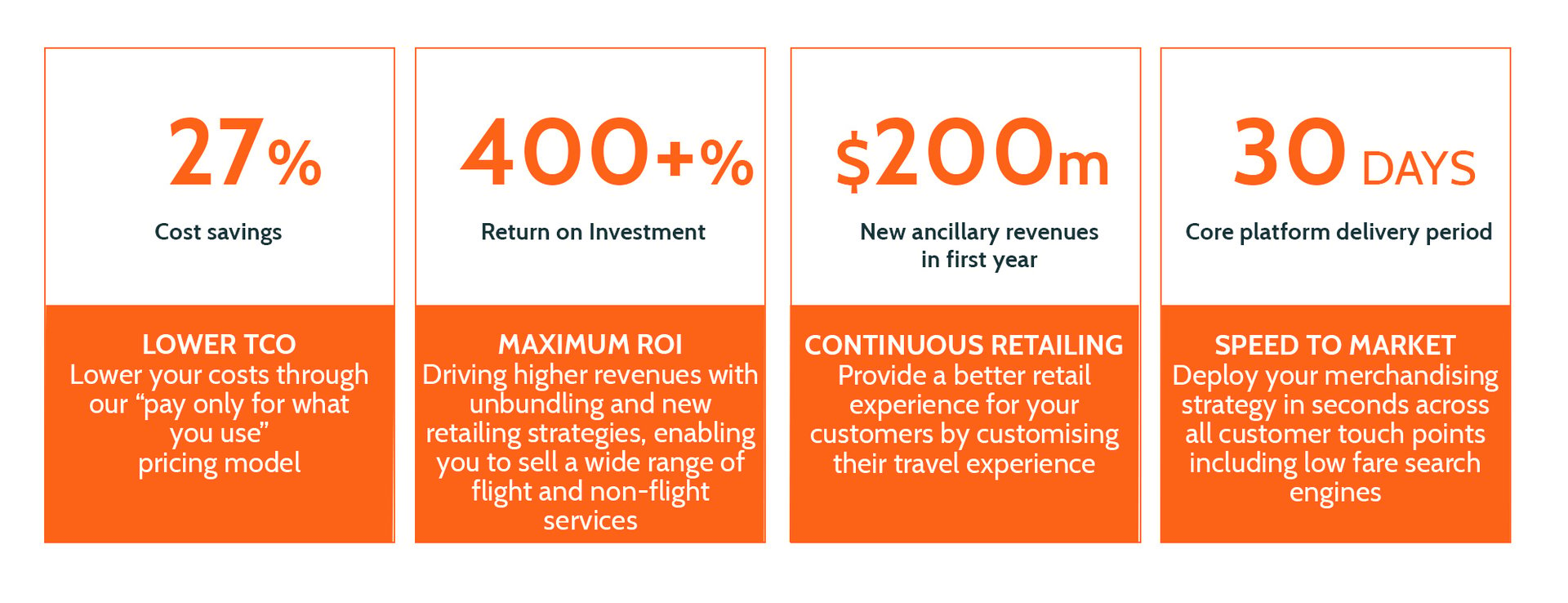COVID-19 has swept the globe, spreading uncertainty and disruption wherever it goes. These are undoubtedly challenging times, in which we are all anxious about our loved ones, friends, front-line workers and business colleagues, yet we are also overwhelmed with unprecedented business challenges facing our industry.

This is no ordinary crisis: fundamental changes in consumer behaviour and demand patterns have already occurred. Governments will make even more significant interventions. And airlines will have to continuously adapt to new and uncertain market conditions. Suddenly, it’s impossible to forecast and analyse trends. Traditional industry benchmarks, KPIs and insights are now obsolete (refer to chart). However, while uncertainty rules the day, it is still possible to find new growth, as the industry continues to restart its engines.
Protect your customers and grow your revenues
Airline Retailing, the latest development in airline sales and distribution, is one of the biggest industry disruptions in recent years. In a nutshell, retailing allows airlines to sell new products in new innovative ways. To get there, with the support of IATA, the airline community has worked together to shape and develop three critical new concepts. The first is New Distribution Capability (NDC), a technology communications standard (and ecosystem) that allows airlines to include a great deal more content (ancillaries and other unique and essential products and services) in their offers to travel agencies and consumers. Secondly, ONE Order eliminates the current booking and ticketing records and combines the content of those into a single retail and customer-focused order. Finally, dynamic offer builds on these technologies to offer customers flexibility in what they want and what airlines can charge for various options. Although, to be considered “dynamic”, the offer must be constructed by the airline and in real-time in response to a customer shopping request.
In the last ten years, revenue generated from ancillaries has increased five-fold. IATA estimated that $873 billion would be spent on airfares in 2019. Ancillary revenues accounted for 12 per cent of global airline revenue or $23.91 per passenger[1].
Why does airline ancillary revenue matter?
The short answer is that it generates a lot of money. The trend in the industry continues to shift from all-inclusive bundled fares towards base fares, where the consumer adds desired services - known as “à la carte”. This trend isn’t just restricted to the low-cost carriers, the full-service airlines are also doing this, where seat selection is no longer free, even in the premium cabins where airlines continue to experiment with unbundled fares in business class.
However, in these unprecedented times, finding growth is a challenge. As a result, growth isn’t just about building value - it's fundamental to survival.
So how do airlines do this?
The key is a robust retailing and merchandising platform-one that is anchored around the customer and driven by intelligence to deliver exceptional customer experiences at scale, agility and speed to market - the right offer, at the right time, and to the right customer. Hence, the offer, is an airline’s greatest asset.
We propose three clear actions for airlines:
1. Spend to save
These days, it’s not enough to just have a Passenger Service System (PSS) and expect positive results. Airlines that are survivors deliver game-changing experiences and products, by investing, adopting and integrating Next-Gen retailing technologies to achieve higher efficiency and growth. These survivors embrace change and leverage the right combinations of merchandising technologies and tools - and they do it continuously. They avoid being trapped by legacy costs, inflexible PSS systems and traditional mindsets by investing in Next-Gen products that provide speedy ROI.
2. Reimagine to meet evolving demand
The ability to quickly tailor existing products, offers and services to new customer needs is essential. Being able to prioritise the right customers and create smarter, seamless and secure experiences at every moment of truth, defines expectations in the retailing world. Customers in turn expect their experiences to be constant, continuous, customised and cross-channel. Growth no longer depends solely on pushing customers through the funnel; increasingly, it is tied to delivery of continuous customer experiences (refer to diagram below).

Exhibit: Continuous Retailing
3. Unlock the fastest path to revenue
Airlines which embrace merchandising and retailing are the ones who will survive. Already, several of the world’s largest airlines have embraced retailing and have started to develop systems and standards. These early adopters are already selling a significant percentage of orders through new retailing approaches and NDC channels. Yet many others have held back, particularly smaller and regional carriers, who see the potential, but are not sure how they fit in. To help all carriers develop their strategies, our refreshed, flagship products (see below) are here to help you on your journey. We have designed our products to “right size” to the airline’s needs-seamless integration with core and third-party systems, higher performance, scalability and reliability, which deliver the lowest TCO and maximum ROI.

Click here to view Datalex Product Portfolio
Next... find your new growth pathways
The future will belong to the prepared. It is no secret that the aviation industry is characterised by its susceptibility to economic downturns, high operating costs, and downward pressures on fares. While it might sound counter-intuitive to spend time today identifying new growth paths, lessons from the recent two downturns suggest that organisations that balanced growth and cost outperformed their competitors.
How can airlines do this?
Be ready for what’s next and prioritise three goals:
1. View merchandising through a customer lens
The most fundamental requirement is the ability for an airline to be able to connect with the customer at every touch point, each of which offers an up-sell or cross-sell opportunity. The timing of the up-sell needs to be considered, and the best time to reach a traveller depends on the specific offer. The shopping stage is the ideal time for airlines to engage with the customer and tailor key value-add items such as hotels, insurance or car rental. Three days prior to departure is when the customer begins to focus on pre-trip items such as parking, airport transfers, wi-fi and additional luggage. Check-in is another key window of opportunity: upgrades, lounge access, and duty free shopping.
2. Rethink your distribution channels
There is a clear trend in the industry toward the use of multi-channel approaches to engaging with customers. But in focusing on multi-channel, airlines may be overlooking a more fundamental need—for a seamless, omni-channel approach that provides a single, unified experience for the customer across all channels. This requires a flexible, integrated and responsive technology platform that can support new products and services, facilitate the new operating model, and keep pace with the rapidly evolving consumer.
3. Define an approach to invest in what’s next
Powered by technology, analytics and big data, airlines can deliver innovative experiences in ways that bridge marketing, distribution and service interactions. And they can do so by integrating across all channels, and ultimately, by providing personalised customer interactions. However, strategy without execution is a significant barrier. Airlines need to ask themselves whether they are investing just in fixing the past, or building growth for the future. Achieving an omni-channel merchandising capability requires the executional courage to move forward, with the right mindset, and with the right partner who has the know-how to get the job done…quickly.
Making the impossible…possible
To position their airlines for growth in the recovery, airline leaders are now thinking about disruption more pointedly and are strategising to make their businesses more resilient and competitive.
As we begin to move towards a brighter future, we encourage you to consider three possible actions:
1. Pursue disruptive growth
There has never been a better time to become an airline retailer. Like the market leaders, you can put the newest and best technologies to the greatest use on the abundance of data you have available-leveraging analytics to drive granular insights that inform your growth strategies. Look to frequently challenge the status quo in pursuit of better customer experiences and more sustained growth.
2. Rebalance investments
Determining how to rebalance commercial investments in the months ahead will be crucial. However, a rush to radically scale back customer and technology investments often leads to unintended and detrimental consequences that can only be seen clearly in hindsight. There will inevitably be more of a focus on instant cost cutting, but product investments that yield high ROI, over the short-term, should be considered.
3. Build for resiliency
Survival now hinges on business resilience. Accelerate your retail and merchandising ambitions, acquire new differentiating capabilities and place growth bets at a time when others are retrenching and recovering. The time for survivors to take action is NOW.

Datalex Merchandiser Key Benefits
How Datalex can help
As you take to the skies again, Datalex, too, is relaunching. Our refreshed, flagship products are here to help you on your journey and make retailing easy, giving you, and your customers, the flexibility you need. At Datalex, we are helping our airline customers navigate this crisis with our portfolio of next generation solutions, that reduce costs and pivot to the NEW: new retail models, experiences and revenue growth, providing a balanced approach to managing near term growth, with piece of mind in future-proof technology. This allows our customers to outmanoeuvre uncertainty, so that they emerge from this crisis stronger than ever. With Datalex, our customers… DO MORE.
[1] IATA Economic Performance of the Airline Industry (Dec-2019) and research conducted by IdeaWorksCompany.
This article was originally published on Phocuswire

Please fill in your details below and we'll email you the brand new
Datalex Product Brochure.
